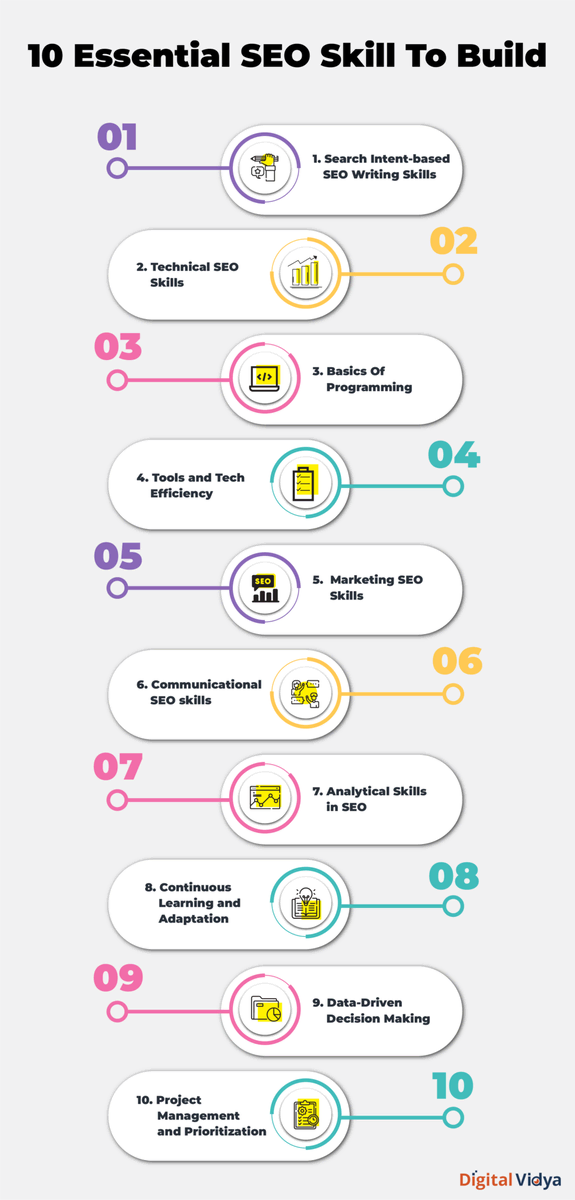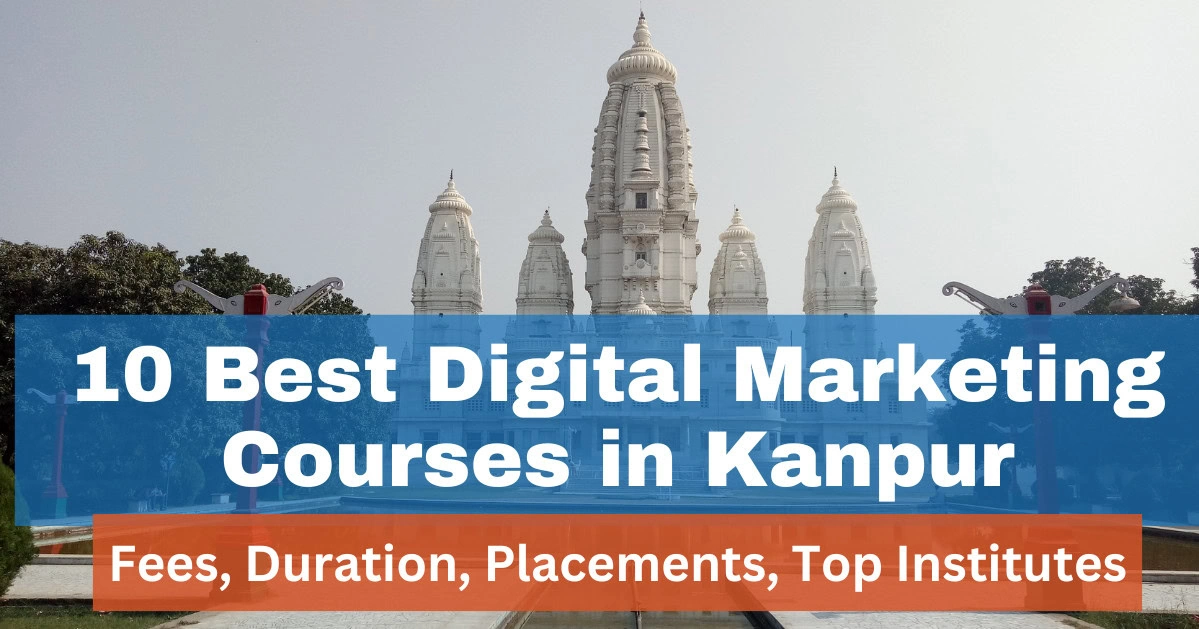SEO skills encompass the expertise needed to optimize websites for search engines, enhancing their visibility and ranking. These competencies are crucial in today’s digital landscape, where 68% of online experiences begin with a search engine.
Mastering SEO skills not only boost organic traffic but also improves user experience, increases conversions, and provides a competitive edge. From crafting search intent-driven content to mastering technical aspects, SEO proficiency spans various domains.
This post explores ten essential skills for 2024, including writing, technical optimization, programming basics, tool proficiency, marketing strategies, communication, analytics, continuous learning, data-driven decision-making, and project management.
By honing these skills, search engine optimizers can navigate the ever-evolving digital realm, turning challenges into opportunities and driving sustainable online growth for businesses.
SEO: Definition
SEO, or Search Engine Optimization, is the art and science of enhancing website visibility in organic search results, driving targeted traffic through strategic content creation, technical improvements, and off-page tactics.
Understanding the fundamentals of digital marketing is crucial for online success. Marketers and business owners alike should prioritize expanding their knowledge base to effectively learn the introduction of SEO.
The various SEO practices are dependent on a thorough knowledge of the concepts and also require the knowledge of various SEO tools to further measure the performance.
Before we dive into the details, let’s take a look at an overview of the 10 essential SEO skills every search engine optimizer should possess in 2024. This infographic provides a quick snapshot of the diverse skill set required to succeed in the ever-evolving field of SEO.

1. Search Intent-based SEO Writing Skills
Mastering search intent-based SEO writing is paramount for modern optimizers. This skill revolves around understanding and addressing user needs through content creation. Key phrase analysis forms the foundation, allowing writers to identify and target specific queries users input into search engines.
Effective SEO writing requires:
- Observing pain points to create solution-oriented content
- Utilizing semantics and linguistics to enhance relevance
- Implementing SEO copywriting techniques for engagement
By focusing on user intent, content creators can significantly improve their search rankings. According to a study by Semrush, content that aligns with search intent is 1.5 times more likely to rank in the top 10 Google results.
Semantically related terms and natural language processing play crucial roles in crafting intent-based content. Writers must balance keyword optimization with readability, ensuring their text resonates with both search algorithms and human readers.
SEO copywriting techniques, such as creating compelling meta descriptions and using power words, can increase click-through rates by up to 127%, as reported by Backlinko. By honing these skills, SEO professionals can create content that not only ranks well but also satisfies user needs effectively.
2. Technical SEO Skills
Mastering technical SEO skills is crucial for optimizers aiming to enhance website performance and search engine rankings. These advanced SEO techniques focus on the website’s backend structure and functionality, ensuring seamless crawling and indexing by search engines.
Key technical skills include:
- Page speed optimization
- Site architecture improvement
- Mobile page optimization
- Implementation of structured data
Page speed is a critical ranking factor, with Google reporting that 53% of mobile users abandon sites that take longer than three seconds to load. Technical SEO experts employ various methods to boost speed, such as image compression and browser caching.
Site architecture plays a vital role in user experience and crawlability. A well-structured website with logical internal linking can significantly improve organic visibility. According to a Moz study, effective internal linking can increase page views by up to 40%.
With mobile-first indexing, optimizing for mobile devices is no longer optional. Technical SEO professionals ensure responsive design and mobile-friendly features, catering to the 58% of global website traffic that comes from mobile devices (Statista, 2022).
Implementing structured data and schema markup helps search engines better understand content context, potentially boosting click-through rates by 30% (Search Engine Journal).
3. Basics Of Programming
Having a foundation in programming languages provides a significant competitive edge. SEO professionals with coding skills can more effectively optimize websites, troubleshoot issues, and implement advanced techniques to improve Core Web Vitals.
Essential programming languages for SEO include:
- HTML for structuring web content
- CSS for styling and responsive design
- JavaScript for interactive elements and dynamic content
- PHP for server-side scripting
- Python for data analysis and automation
According to a survey by Moz, 72% of SEO professionals believe that basic coding knowledge is important or very important for their role. HTML and CSS proficiency allows for direct manipulation of on-page elements, crucial for technical SEO optimization.
JavaScript knowledge is increasingly vital, with Google reporting that 98% of websites use it. Understanding JS helps in diagnosing rendering issues and improving page interactivity, directly impacting Core Web Vitals scores.
PHP skills enable SEO experts to modify content management systems like WordPress, used by 43% of all websites (W3Techs, 2023). Meanwhile, Python’s versatility makes it invaluable for data analysis and task automation, with 48% of developers using it for machine learning projects (JetBrains, 2022).
To stay updated and competitive, SEO professionals should continuously enhance their coding skills, adapting to new technologies and search engine algorithms.
4. Tools and Tech Efficiency
Mastering SEO tools and technologies is essential for efficient and effective optimization. Proficiency in these resources streamlines workflows, enhances productivity, and provides valuable insights for data-driven decisions.
Key categories of SEO tools include:
- Keyword research and analysis tools
- On-page optimization software
- Backlink analysis platforms
- Technical SEO audit tools
- Rank tracking and SERP analysis solutions
According to a survey by Ahrefs, 77% of SEO professionals use at least three different tools in their work. Popular choices like SEMrush, Moz, and Ahrefs offer comprehensive suites that cover multiple aspects of SEO.
For those seeking to dive deeper into SEO tools for efficient SEO works, numerous resources are available to guide you through the most effective options and their applications.
Technical audit tools like Screaming Frog help identify on-site issues, with 68% of SEO experts considering it indispensable (BrightLocal, 2021). These tools can uncover critical problems that might otherwise go unnoticed, potentially saving hours of manual work.
Analytics platforms like Google Analytics and Google Search Console provide crucial data on website performance and search visibility. A study by Databox found that 86% of marketers consider Google Analytics as their primary source of SEO insights.
Efficiency in using these tools can significantly impact productivity. SEO professionals who effectively leverage automation and bulk analysis features can reduce task completion time by up to 60% (Marketing AI Institute, 2022).
5. Marketing SEO Skills
Integrating marketing principles with SEO is crucial for developing a comprehensive marketing strategy that drives organic growth. Effective SEO professionals understand the fundamentals of marketing and persuasion, applying these concepts to their content strategy and optimization efforts.
Key marketing SEO skills include:
- Understanding consumer behavior and buyer personas
- Crafting compelling value propositions
- Implementing persuasive copywriting techniques
- Leveraging social media for SEO benefits
A study by the Content Marketing Institute found that 72% of successful B2B marketers use SEO tactics within their content strategy. This integration of marketing and SEO principles leads to more effective content creation and distribution.
Social media marketing plays a significant role in modern SEO. While not a direct ranking factor, social signals can indirectly impact search rankings. According to Hootsuite, 52% of online brand discovery happens on social media platforms, highlighting the importance of a cohesive social media and SEO strategy.
Understanding persuasion techniques, such as Robert Cialdini’s six principles, can enhance the effectiveness of meta descriptions and title tags. A/B testing these elements can lead to a 10-50% increase in click-through rates (Moz, 2022).
Marketing-savvy SEO professionals also excel at creating content that resonates with target audiences. HubSpot reports that businesses using persona-driven content marketing see a 55% increase in organic search traffic and a 97% increase in page views.
By combining marketing acumen with SEO expertise, professionals can create more impactful, user-centric strategies that drive both rankings and conversions.
6. Communicational SEO Skills
In the realm of SEO, technical expertise must be complemented by strong communication skills. These soft skills are crucial for SEO professionals to effectively collaborate with teams, explain complex concepts to clients, and drive successful strategies.
Key communicational SEO skills include:
- Active listening and empathy
- Clear and concise explanation of technical concepts
- Persuasive presentation of SEO strategies
- Effective stakeholder management
According to a LinkedIn survey, 92% of talent professionals consider soft skills equally or more important than hard skills. For SEO experts, these people skills are essential in navigating client relationships and cross-functional team dynamics.
Effective communication can significantly impact SEO success. A study by Project.co found that 66% of projects fail due to poor communication, highlighting the importance of clear, consistent dialogue in SEO campaigns.
SEO professionals with strong communication skills are better equipped to:
- Secure buy-in for SEO initiatives from management (28% more likely, according to Conductor)
- Collaborate effectively with content creators and developers (improving productivity by up to 25%, PMI)
- Explain SEO value to clients, leading to higher retention rates (up to 63% improvement, Databox)
By honing these soft skills, SEO experts can bridge the gap between technical optimization and business objectives, fostering stronger relationships and driving more impactful results.
7. Analytical Skills in SEO
Analytical thinking is a cornerstone of effective SEO, enabling specialists to interpret data, identify trends, and make informed decisions. These SEO specialist skills are crucial for optimizing strategies and achieving measurable results.
Key analytical skills in SEO include:
- Data interpretation and visualization
- A/B testing and hypothesis formation
- Traffic pattern analysis
- Competitor benchmarking
- ROI calculation and performance forecasting
According to a survey by BrightEdge, 97% of marketers believe that SEO and analytics integration is crucial for success. This underscores the importance of analytical skills in modern SEO practices.
Analytical thinking allows SEO professionals to:
- Identify high-impact optimization opportunities (improving efficiency by up to 30%, Gartner)
- Accurately assess the effectiveness of SEO strategies (leading to 20% better ROI, Forrester)
- Predict future trends and adapt strategies proactively (increasing success rates by 25%, McKinsey)
A study by Moz found that SEO specialists who regularly conduct in-depth analyses are 68% more likely to report positive ROI. This highlights the direct correlation between analytical skills and SEO success.
By developing strong analytical capabilities, SEO professionals can transform raw data into actionable insights, driving more effective and results-oriented optimization strategies.
8. Continuous Learning and Adaptation
continuous learning and adaptation are essential for maintaining seo expertise and staying ahead of algorithm updates. This skill is crucial for effective decision making and mastering advanced SEO techniques.
Key aspects of continuous learning in SEO include:
- Staying updated on search engine algorithm changes
- Exploring emerging technologies and their impact on SEO
- Participating in industry conferences and webinars
- Engaging with SEO communities and forums
- Experimenting with new strategies and tools
According to a survey by Search Engine Journal, 64% of SEO professionals spend 2-5 hours per week learning about SEO. This commitment to ongoing education is critical in an industry where Google makes over 3,000 algorithm changes annually (Moz, 2022).
Continuous learning enables SEO specialists to:
- Adapt strategies quickly to algorithm updates (improving performance by up to 28%, BrightEdge)
- Implement cutting-edge techniques before competitors (gaining a 31% advantage in rankings, SEMrush)
- Make informed decisions based on the latest industry trends (increasing success rates by 42%, Ahrefs)
A study by HubSpot found that SEO professionals who dedicate time to continuous learning are 57% more likely to report above-average ROI from their efforts. This underscores the direct correlation between ongoing education and SEO success.
By prioritizing continuous learning and adaptation, SEO experts can refine their decision-making skills, enhance their expertise, and excel in advanced SEO practices.
9. Data-Driven Decision Making
Data-driven decision making is crucial for developing effective strategies and achieving measurable results. This skill enables SEO professionals to base their actions on empirical evidence rather than intuition or guesswork.
Key aspects of data-driven decision making in SEO include:
- Collecting and analyzing relevant metrics
- Interpreting search console and analytics data
- Conducting A/B tests to validate hypotheses
- Using competitor data to inform strategies
- Leveraging predictive analytics for forecasting
According to a study by Forrester, companies that embrace data-driven decision making are 58% more likely to beat revenue goals. In SEO, this approach leads to more targeted and effective optimization efforts.
Benefits of data-driven SEO include:
- Improved ROI on SEO investments (up to 23%, McKinsey)
- More accurate performance predictions (85% accuracy, Gartner)
- Better allocation of resources to high-impact areas (30% efficiency increase, Deloitte)
A survey by BrightEdge found that 56% of leading marketers cite data insights and analysis as the most important skill for SEO success. This underscores the importance of data literacy in modern SEO practices.
By adopting a data-driven approach, SEO professionals can make more informed decisions, optimize strategies more effectively, and demonstrate clear value to stakeholders.
10. Project Management and Prioritization
Effective project management and prioritization are crucial skills for SEO professionals managing multiple tasks and stakeholders. These abilities ensure efficient resource allocation and timely delivery of SEO initiatives.
Key aspects of project management and prioritization in SEO include:
- Setting clear goals and KPIs
- Creating and managing timelines
- Allocating resources effectively
- Balancing short-term tactics with long-term strategies
- Adapting to changing priorities and algorithm updates
According to a PMI study, organizations with strong project management practices waste 28 times less money than those with poor practices. In SEO, this translates to more efficient use of time and budget.
Benefits of strong project management in SEO:
- Improved on-time delivery of SEO projects (by up to 30%, Capterra)
- Better alignment of SEO goals with business objectives (44% more likely, Gartner)
- Increased stakeholder satisfaction (by 22%, PMI)
A survey by Conductor found that SEO teams with structured project management processes are 37% more likely to report positive ROI. This highlights the direct impact of organizational skills on SEO success.
By mastering project management and prioritization, SEO professionals can juggle multiple tasks effectively, meet deadlines consistently, and deliver measurable results, ultimately driving better SEO outcomes and business growth.
Qualities To Become an SEO Expert
- Curiosity: Always questioning, learning, and exploring new SEO trends and technologies.
- Adaptability: Quickly adjusting strategies in response to algorithm updates and market changes.
- Patience: Understanding that SEO results often take time and maintaining persistence.
- Creativity: Developing innovative solutions to complex SEO challenges.
- Attention to detail: Meticulously analyzing data and fine-tuning optimizations.
- Strategic thinking: Aligning SEO efforts with broader business objectives.
These qualities form the foundation of a successful SEO expert’s mindset. They enable professionals to navigate the ever-evolving landscape of search engine optimization, consistently delivering results in a competitive digital environment. By cultivating these attributes, aspiring SEO specialists can position themselves for long-term success and growth in the field.
For a comprehensive look at the essential qualities that define top-tier SEO professionals, check out our in-depth guide: “10 Must-Have Qualities of an SEO Expert“. This resource provides valuable insights into the characteristics that set exceptional SEO practitioners apart from the rest.
Conclusion
In conclusion, mastering these 10 essential SEO skills is crucial for anyone aspiring to excel in the dynamic field of search engine optimization in 2024 and beyond.
From technical expertise to analytical prowess, and from marketing acumen to effective communication, each skill plays a vital role in crafting and implementing successful SEO strategies. As search algorithms continue to evolve, the importance of continual learning and adaptation cannot be overstated.
For those looking to deepen their knowledge and sharpen their skills, consider enrolling in a comprehensive SEO course that covers these critical areas.
By honing these skills and cultivating the qualities of a top-tier SEO expert, professionals can navigate the complexities of the digital landscape, drive organic growth, and deliver measurable results for their clients or organizations.
Stay curious, remain adaptable, and never stop optimizing – the world of SEO awaits your expertise.








